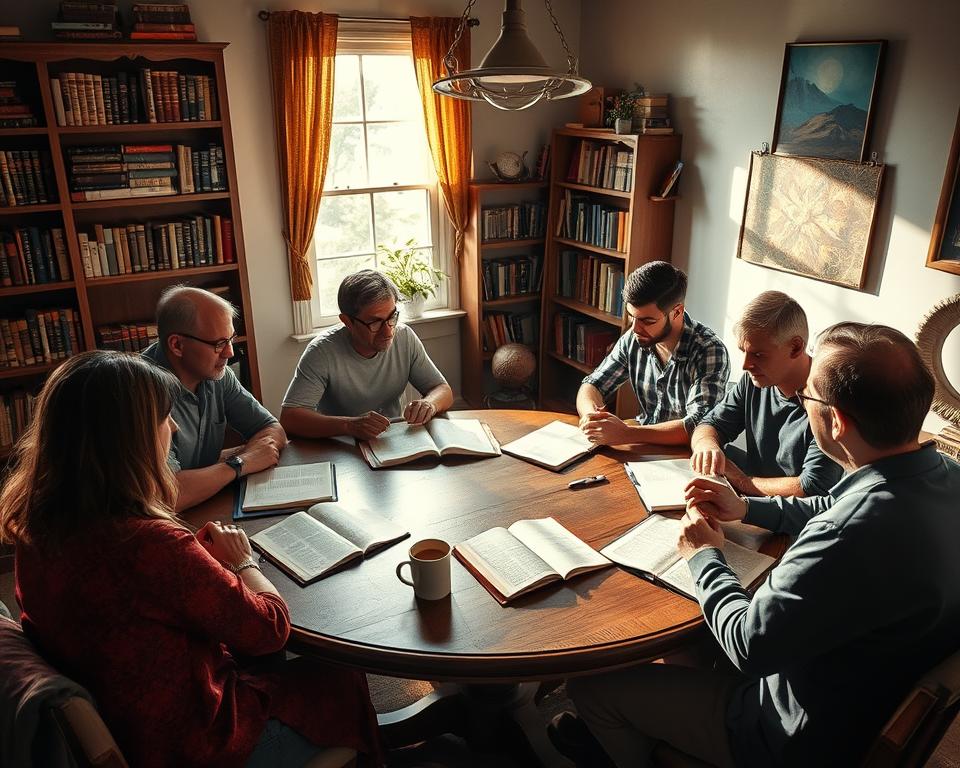Are you ready to guide others through the rich tapestry of Scripture? Learning to lead a Bible study group can change your spiritual journey and those around you. With the right approach, you’ll create a space where faith grows and hearts connect. Let’s explore how to nurture a thriving Christian group discussion that deepens everyone’s understanding of God’s Word.
Leading a Bible study is like embarking on a spiritual adventure together. As a leader, you’re not just sharing knowledge; you’re facilitating growth, fostering community, and igniting passion for Scripture. Whether you’re meeting virtually or in person, your role is key in shaping the group’s experience.
Precept, a trusted name in Bible study resources, offers invaluable training for leaders. Their online courses and workshops, such as “Essentials of the Precept Bible Study Method,” equip you with tools to guide your group effectively. Remember, successful group Bible study hinges on your ability to be an expert, cheerleader, and loving referee all at once.
To kick off your sessions right, start on time and set a welcoming tone. Use name tags initially to help everyone feel known and valued. As you dive into discussions, balance affirming contributions with keeping the conversation on track. Time management is key – end on time and maintain a steady pace to cover your material thoroughly.
Understanding Your Role as a Bible Study Leader
Leading a Bible study group is a rewarding journey. It requires spiritual leadership and understanding of group dynamics. Your role is to guide, motivate, and nurture your group.
Being the Biblical Expert and Guide
As a Bible study facilitator, you’re the compass for your group. Be prepared with a deep understanding of the material. It’s not about having all the answers, but guiding discussions and sharing insights.
Remember, your role is to enable meaningful conversations. Encourage participation from everyone.

Serving as Group Cheerleader and Motivator
Your enthusiasm sets the tone for the group. Be yourself and show genuine excitement for the Word. Pray for your members weekly and create an atmosphere where everyone feels valued.
This positive energy will inspire participation. It will foster a love for Scripture study.
Creating a Loving and Supportive Environment
A successful Bible study group thrives on trust and openness. Create a safe space where members feel comfortable sharing their thoughts and questions. Be ready to redirect discussions gently if they stray from biblical truths.
Your goal is to nurture spiritual growth in a loving, supportive setting.
“Lead others only as far as you’ve gone yourself.”
By embracing these aspects of Bible study facilitation, you’ll create a dynamic environment for spiritual growth and learning. Remember, your personal connection with God fuels your ability to lead effectively. Schedule daily time for prayer and reflection to ensure you’re well-equipped for this important role.
Essential Preparation Steps for Bible Study for Groups
Getting ready for Bible study is key for a great group experience. Planning ahead helps everyone grow in faith together. Let’s look at important steps to make your study session a success.
Setting Up the Physical Space
Find a room that’s comfy, well-lit, and has good seating. Arrange chairs in a circle for better talking. Make sure you have enough Bibles, pens, and paper for everyone. Use name tags at the start to help people connect.

Preparing Study Materials and Resources
Get all your group study materials ready before the session. This includes your Bible, study guides, and any handouts. Prepare extra insights or questions to make discussions richer. Having everything ready shows you respect people’s time and makes learning better.
Developing a Clear Session Structure
Make a simple plan for your study session. Start with a prayer, then read the Bible. Give time for discussion and personal reflection. End with prayer requests and a closing prayer. Keep to your schedule to respect everyone’s time.
- Opening prayer (5 minutes)
- Bible reading (10 minutes)
- Group discussion (30 minutes)
- Application (10 minutes)
- Closing prayer (5 minutes)
Good Bible study preparation leads to deep discussions and spiritual growth. By focusing on these steps, you’re preparing for a powerful study experience.
Creating an Engaging Discussion Environment
A successful Bible study discussion needs a place where everyone can share and talk about their faith. Think about the physical space and how people interact in your group.
The setting is key for keeping everyone involved. Pick a cozy spot like a home to make newcomers feel welcome. Use a circle for seating to help everyone see each other and talk better. Good lighting is also important to keep the mood warm and the focus sharp.
To get everyone involved, start with a friendly vibe. Greet everyone warmly and ask them to turn off their phones. Having extra Bibles shows you care and helps everyone follow along.
“Icebreaker questions are a powerful tool for building connections and creating a sense of belonging.”
Start with icebreaker questions to get people talking. These questions can lead to deep conversations about faith, personal stories, and life paths. They help build trust and open up the group to deeper spiritual talks.
- Use open-ended questions to promote meaningful conversations
- Balance personal and spiritual themes in your questions
- Create a welcoming atmosphere where everyone feels comfortable sharing
By carefully planning your discussion space, you’ll make a place where everyone feels valued and ready to dive into meaningful Bible study talks.
Managing Group Dynamics and Participation
Leading a Bible study group can be both rewarding and challenging. As a leader, you play a key role in making sure everyone gets a chance to speak. By setting clear expectations and creating a welcoming space, you help everyone feel valued and engaged.
Handling Dominant Personalities
In every group, some people tend to talk more than others. To keep discussions balanced, gently ask others to share. You might say, “Thanks for sharing. Let’s hear from someone who hasn’t spoken yet.” This helps everyone get a chance to contribute.
Encouraging Quiet Members
Some group members might be shy and not speak up. Create chances for them to share by asking open-ended questions. When they do speak up, give them positive feedback to boost their confidence. Remember, silence can also be valuable, allowing for reflection.
Maintaining Focus and Direction
It’s important to keep discussions on track. Set guidelines at the start of each session to set expectations. If conversations go off-topic, gently steer them back. Be ready to address issues like incomplete lessons or gossip with grace and firmness.
“A good leader is one who knows the way, goes the way, and shows the way.”
By using these strategies, you’ll make your Bible study group more engaging and inclusive. Your role is to guide the group while helping each member grow in their understanding of Scripture.
Effective Bible Study Teaching Techniques
Learning effective Bible study methods makes group learning better. By using different teaching styles, you can make sessions fun and engaging for everyone.
Using Strategic Questioning Methods
Verbal teaching is the most common way in Bible studies. Ask thoughtful questions that start discussions and make people think. This method works well online and in person, making everyone more involved and understanding the Bible better.
Incorporating Scripture Reading Practices
Visual teaching helps learners remember more. Use slides, videos, or timelines to show biblical ideas. Ask people to imagine scenes as they read different translations. This way, 80% of Bible studies stay on track and make sense.
Facilitating Meaningful Discussions
Group talks are key to understanding the Bible. In fact, 62% of group talks make people love the Bible and each other more. Use online breakout rooms or small groups for in-person talks. Remember, 53% of good Bible study leaders are great at leading discussions.
“Let the word of Christ dwell in you richly, teaching and admonishing one another in all wisdom.” – Colossians 3:16
By mixing these teaching methods, you’ll make a lively learning space. It will help your group grow spiritually and understand the Bible better.
Building Long-term Group Success and Growth
Creating a strong Bible study community is vital for spiritual growth. Small groups of 5-12 people meeting often feel more connected and satisfied. Make sure your group is a place where everyone feels safe to share and learn.
Encourage everyone to come regularly and do their personal study. This can boost Bible study by 20% in six months. Celebrate when group members share their spiritual insights. If problems arise, handle them with love and care to keep the group positive.
Change up who leads the group to bring in new ideas and keep things interesting. Check in with your group to see what they need and adjust your plans. Using active learning methods can really help everyone get more out of the study.
Starting Fall 2024, The Gospel Project Bible study for adults will use this approach. It aims to increase group participation and learning.
Also, remind your group to apply what they learn in their daily lives. Encourage them to serve together in church projects. This way, they can live out their faith and strengthen the church community.





